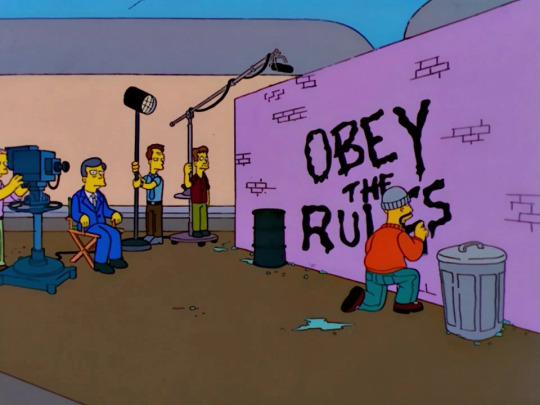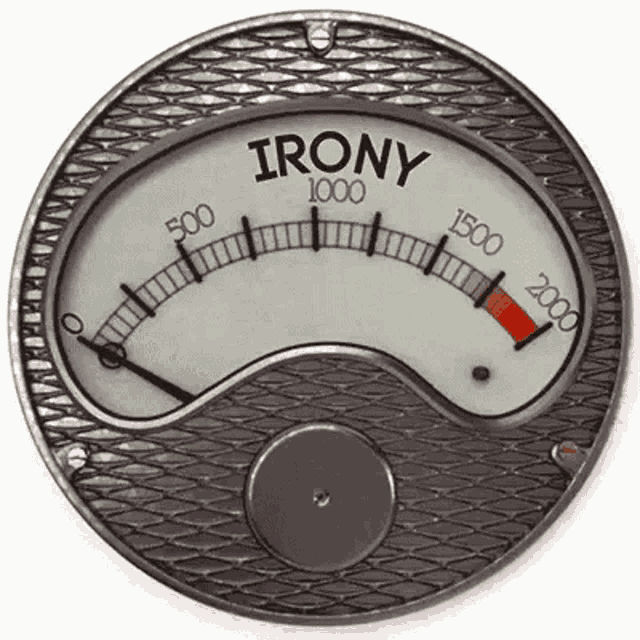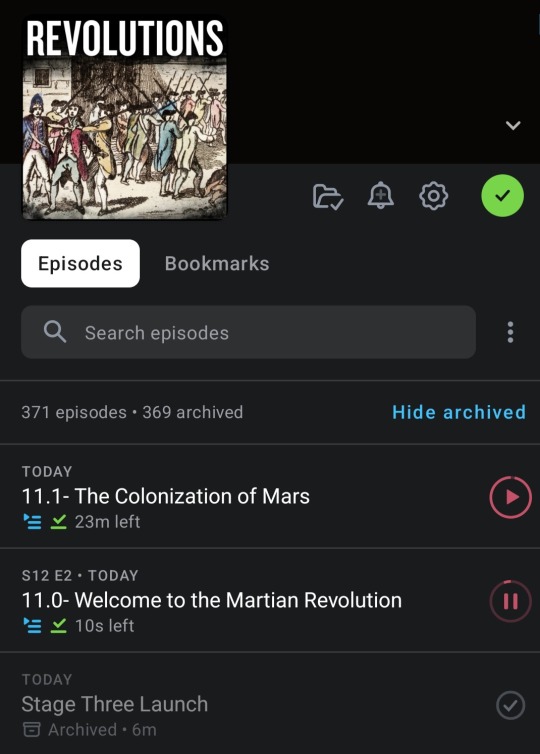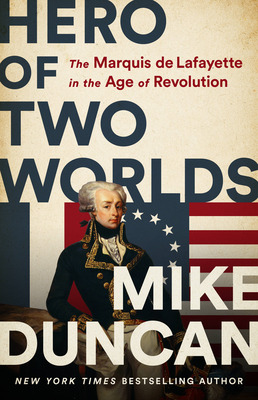#mike duncan
Explore tagged Tumblr posts
Text
Mike Duncan, of the Revolutions podcast (which covered the English Revolution, American Revolution, French Revolution, Haitian Revolution, Latin American Wars of Independence, French Revolution of July 1830, Revolutions of 1848, Paris Commune, Mexican Revolution, and Russian Revolution), has started a new season covering, in the same documentary style, a fictional Martian Revolution in the 2200s.
It’s very interesting, because you can see the elements that are inspired by or parallel to some of the common patterns and major characters in the previously-covered historical revolutions. I’m going to jot down some thoughts so I can keep them on hand as the season continues.
Patterns
In his conclusion to the Revolutions series, Duncan concludes that the build up to a potential (but still far from inevitable) revolution begins when a system that had previously been stable – note, not necessarily good, just stable – becomes unstable, either because it fails to adapt to changes, or because it introduces new changes that alienate an important part of its power base.
The Martian Revolution begins with both. The setting is a corporate-ruled solar system in which Omnicorp is by far the dominant corporation out of five major ones, due to its control of an extensive but exhaustible resource that enables the generation of emissions-free energy. Mars is home to a lot of this resource, leading to the establishment of resource-extraction colonies by Omnicorp. The first stage producing instability is a long period of “extremely gerontocracy”, where CEO Vernon Byrd manages to get him and the company directors who are his cronies appointed to their positions “for life” when he is 100 years old. They then use secret life-extendeing drugs to just…keep living, but become more and more out of it, and their aides/exec assistants end up running the company.
(The importance of access to the person in power reminded me a bit of the sections in the Russian Revolution podcast on the months leading up to Lenin’s death, but there are plenty of other historical examples. In terms of the gerontocracy specifically and the way it prevents chamge and adaptation, the parallel that comes to mind is the very-long reign of Franz-Josef of Austria-Hubgary from 1849 to WWI.)
This led to a lot of things in the daily running of the company being neglected, and a black market of workarounds cropping up to keep things functioning, with Mars operating mostly on its own. This is a clear analogy to the period of “benign neglect” in the American colonies leading up to the American Revolution, and in this period a more distinct Martian identity develops.
Then things get further destabilized when the gerontocracy is finally forced out, and the new CEO – a rich kid who thinks he’s a genius, and has the asset of being one of the few with the social position and assertiveness to have challenged the gerontocracy – brings in a bunch of new, modernized rules that he thinks will getthings running smoothly again, but in fact only break them further.
This is, again, pretty clearly analogous to the kind of events producing both the American Revolution and the later Latin American Revolutions: a colonial power rapudly making changes (to increase the colonies’ profitability) that are highly unpopular with the people living in those colonies – even (or especially) with the higher echelons of the colonial population.
The other place where we have clear parallels with the historical revolutions Duncan has covered is in the layout of the class system. The Martian class system is made up of Class S personnel (top executives, mostly from Earth but a few born on Mars), Class A (other high- and mid-level managers, a mix of Earther and Martian), Class B (the intelligentsia and cultural professionals – doctors, lawyers, writers, artists, etc.), Class C (immediate supervisors, often from Earth on contracts of a few years, intending to earn some money and return home), and Class D (the majority, the regular workers who make the colony run, most of whom are Mars-born but some Earth-born). For extra vibes, the top three classes are referred to as the “SABs” (amazing how similar that sounds to SOBs) and the lower two are referred to by some SABs as the CDs (“seedies”).
Based on the previous seasons of Revolutions, this all gives a pretty clear sense of how things will play out. The Class B intelligentsia (especially the younger ones) are the core of upper-class revolutionary movements, joined by some of the Class S and A who are just too fed up with how badly Omnicorp is bungling things. Class D are the popular masses whom they have to ally with in order to win. Class C are roughly our stand-in for the lower-middle classes or petit bougeoisie (or, in Haiti, the lower-class white population): they despise the Class D personnel and resent the scornful or patronizing attitudes of the SABs, and tend to be the most counterrevolutionary; them being mainly on short-term assignment from Earth rather than identifying with Mars adds to this.
Oh, and there’s one major city (Olympus) and two lesser ones that resent Olympus’ primacy, which is going to give us some similar between-colony dynamics from the American and/or Latin American revolutions (the two went rather differently in how they played out and where they ended up).
Characters
There’s a few main figures who have been introduced so far.
1) José de Petrov, a young B-class radical who tries to launch a revolution with some of his peers, grounded in the belief that colonies having revolutions through which they gain independence is a historical inevitability. They try to gain control of key strategic sites in the main city of the Mars colony, their attempt is brutally crushed and all are killed, and it is mostly hushed up, but some people do find out about it, and it’s foreshadowed that information about it will come out later and serve as an impetus to the successful Martian Revolution. (Let others rise to take our place until the earth Mars is free.)
This is a callback to several things historically – the ‘historical inevitability’ bit is definitely one to Marxism – but the one that comes to my mind is the Decembrist revolt in early-1800s Russia: it’s led by idealistic young people with strong convictions, and it ends quickly and violently. You could also see him as a less successful and less skilled Lenin. Another parallel is the unsuccessful attempt at Colombian independence by Francisco de Miranda.
2) Mabel Dore. She’s the daughter of two S-class personnel, one of the richest people on Mars and probably the richest Martian-born person. She’s radicalized by learning about Petrov’s rebellion and the way it was crushed, and also influenced in her Martian patriotism by going to university of Earth and being treated disdainfully – or at best, as a curiosity – while there. I’m embarassed at how long it took me to figure out who she was paralelling, because she is, of course, Mars’s Simón Bólivar.
She is lookimg potentially very successful thus far in the series, because thanks to widespread philanthropy she is already extremely well-regarded by the Class D personnel, which is exactly the kind of cross-class alliance you tend to need for a successful revolution.
(To be clear: none of this is ‘laws of history’. The idea of ‘laws of history’ is bunk. There’s no particular circumstance that guantees a successful revolution – everything is affected by chance and contingency. But there are patterns, and one of them is that a successful revolution against an existing order generally requires both people who are embedded i. existing power structures – upper classes – and people with numbers – lower classes. And that one, the other, or both frequently go for each others’ throats as soon as the initial revolution is achieved. So pre-existing good feeling is a very good sign for Mabel Dore.)
3) Timothy Werner. This is, to use Mike Duncan’s term, our “great idiot of history”. (Basic thesis: you don’t get a successful revolution without the main person in power muffing up very, very badly.) Due to being a person with energy and some intelligence in an old, malfunctioning, and moribund company, and due to being near the top of the upper class, he developed the firm opinion that he was a genius who could fix everything, and that anyone who opposed his ideas or raised problems with them was simply obstructionist. As the new CEO of Omnicorp, he’s going to set off the Martian Revolution.
14 notes
·
View notes
Note
What do you think the best biography on Lafayette is? I’ve read the ones by Mike Duncan, Laura Auricchio, and Jason Lane (and of course Laf’s own memoirs!). I know of the Harlow Giles Unger one but just haven’t gotten my hands on it.
Dear Anon,
that is a good question, actually. It normally depends on the question that you want to get an answer to. The books by Harlow Giles Unger (Lafayette) and Mike Duncan (The Hero of Two Worlds) are probably the most “general” biographies out there at the moment. Other books put a bit more focus on a specific topic, like La Fayette’s relationship to George Washington and America, his involvement in the French Revolution, his time in prison and exile or his political agenda in the 1820s and 30s.
That aside, my favourite is probably For Liberty and Glory by James R. Gains. That was my third (or so) book on La Fayette and I really enjoyed it and like to pick it up again from time to time. I also liked The Marquis: Lafayette Reconsidered, the book by Laura Auricchio that you mentioned. Another good one (but only available in German) is General Lafayette in Wittmoldt: ein Leben für die Freiheit by Alfons Galette.
There are many good books about La Fayette and for me personally, in order to stand out, a book needs to have something special, like some new insights or an interesting research focus. But in the end it depends on what you “want” from the book.
I hope you have/had a wonderful day!
#ask me anything#anon#resouces#books#mike duncan#harlow giles unger#james r gains#alfons galette#laura aurcchio#marquis de lafayette#la fayette#lafayette#french history#american history#history#american revolution#french revolution
13 notes
·
View notes
Text

Mike Duncan of the revolutions podcast: I've been writing some punk rock songs about the French Revolution.
Mike Duncan: So if you want to see us live, get vaccinated -
Me:

Imagine telling people to take a government sponsored, endorsed, and protected vaccine, so the government will loosen restrictions, so you can have a punk rock show.
(For extra irony he said this in August 2021, and he said there was a chance the performance would get cancelled, even if it was pushed back to spring 2022.
This has exactly the same vibe as antifa supporting the Canadian government against the trucker protests. They were literally siding with the government trying to force workers to comply for the greater good, and calling the workers who didn't want to do what the state said fascists.
29 notes
·
View notes
Text
I’m finally resuming my listening to Mike Duncan’s Revolutions podcast at the Russian Revolution, and I am definitely getting a lot out of it. Better history podcasts like Duncan’s mostly serve me to connect gaps and connect dots I have already heard about, and provide interesting directions for future investigations.
So far, it sounds as if the fandom of a novel that I hadn’t heard of previously was kinda influential. Like, Lenin used its title for a famous pamphlet of his level influential. This novel sounds ludicrously shojo-fandom drama shit with romantic entanglements, love triangles, and love suicides taking up a lot of the plot. It apparently has an OT3 endgame!
Like, I don’t see anything on Ao3 for it and I suspect that there’s no English language fandom of any sort, but I definitely want to read it now.
#what is to be done#vladimir lenin#nikolay chernyshevsky#original post#book club#russian literature#ot3#mike duncan#Russia revolution#revolutions podcast
8 notes
·
View notes
Text
In my opinion, the current Martian Revolution arc in the Revolutions podcast by Mike Duncan is the best podcast out right now. It's brilliant fiction based on a deep understanding of how revolutions start and change. It's also funny as hell.
4 notes
·
View notes
Text
3 notes
·
View notes
Text
I've been listening to the first season of Revolutions, on the English Civil War, and it's striking how often events follow the pattern 'this battle/meeting/parliament could have ended the civil war, except that some aristo did something so mind-numbingly stupid even by the standards of contemporary observers that it actually kicked off a whole additional war.' Many such cases in British history, broadly.
Also somewhat shocking how ahead of their time the Levellers in the New Modern Army were - proposing a package of reforms to suffrage, religious freedom, the legal system etc, in the mid 17th century that would still be radical during the Age of Revolutions nearly 150 years later.
7 notes
·
View notes
Text
surprise docufiction reboot
Losing my little autistic history podcast nerd mind! 📜 🚀 👩🏾🚀 ✨

4 notes
·
View notes
Text
Shouting into the void just to ask, if you are also listening to the Revolutions podcast’s new season on the Martian Revolution of 2247 pls lmk
#revolutions#frev#speculative biology#podcast#horror#the magnus archives#mike duncan#revolution#speculative fiction
2 notes
·
View notes
Text
Finishing Mike Duncan's revolutions series and I'm sad to think of all the people that would have loved the 21st century.
Prince Rupert would have a series of tik toks on hair care products and occasionally one on proper horse riding techniques
Jefferson would be on Threads posting nonsense for views, blocking anyone who asks him about Palestine
Marat would be on Twitter and be insufferable. Just terminally online brain rot. Novel length threads that never end.
Saint-Just would be posting detailed take down videos on YouTube
Louverture would probably be on Tumblr, in a constant feud with Sonthonax. They both blocked Napoleon
Rochambeau meanwhile would be posting incredibly offensive things and claiming they're just jokes.
Bolivar gives strong Facebook energy. He's Facebook friends with Miranda, but Miranda is Facebook friends with about 3000 people so it's not much.
Louis Phillipe is 100% on Threads posting the most perfect centrist takes of all time. He also blocks you for mentioning Palestine.
Lajos Kossuth had a giant following on Tumblr, but seriously fucked it up when he went on a rant about immigrants not learning the language of the country they immigrate to. Also he turns out to be a TERF.
Everyone from the Paris Commune is on Tumblr and are just constantly screaming at each other. Alphonse Tierre is the Tumblr admin who keeps shutting down trans blogs.
Pancho Villa is an expert level shit poster on Twitter. Just brutal take downs left and right.
Trotsky would be posting absurdly long posts on Tumblr that no one reads but everyone shares. Stalin screenshots things out of context to make him look bad.
Lenin somehow shouts free Palestine while also saying Ukraine is the real aggressor.
2 notes
·
View notes
Text
Kind of re-listening to the Revolutions series on 1848 at background noise and, like, Metternich has to be pretty much the closest history has come to producing the whole 'arch-ideologue philosopher king of the Empire engineering all this shit out of actual principle and not self-interest' archetype I was complaining about a bit back.
'foremost defender of royal absolutism on the continent continually stymied by how useless and incompetent the emperor whose absolute rule he serves is' is admittedly a pretty funny bit, though.
64 notes
·
View notes
Text
Mike Duncan!! *shakes fist* *laughs*
I’m continuing with his Martian Revolution documentary-style-fiction season of the Revolutions podcast (which follows the preceding seasons of actual documentaries) and he’s introducing three student characters who I was trying with little success to map to analogous or parallel figures from historical revolutions. The first one was definitely giving me some Robespierre-ish vibes, but I was mostly at a loss for the other two.
…and then he had them meeting up with other students and hanging out in a café and I went 😠😁 because he is, of course, referencing Les Amis de l’ABC and switching from looking for historical references to literary ones they were obviously Enjolras, Courfeyrac, and Combeferre.
Oh, Mike. He’s having fun with this.
12 notes
·
View notes
Note
Have you read Mike Duncan's Hero of Two Worlds? if you did, do you recommend it?
Thank you!

Dear Anon,
yes, I did read Mike Duncan’s Hero of Two Worlds and although it has been a few years, I knew that I was quite exited when the book was first released. I am not a Podcast-person, but I had been told that Duncan is quite an excellent history podcaster, and his book was a more recent publication then some other works out there. Duncan covers La Fayette’s life from cradle to grave with a marked focus on the American and French Revolution – as was expected. His writing style is very comprehensible and although the book is around 500-ish pages, it still was an easy and fast read.
As to recommending it, that depends a bit on what you are looking for in a book about La Fayette. As a general overview about the Marquis’ life, I can recommend the book. Harlow Giles Unger’s Lafayette is often cited as the best general biography but while Unger’s book is maybe a tad more detailed, I prefer Duncan’s handling of source material. There were a few little things that made me pause while reading but these were mostly differentiating interpretations.
As I said, it is a very general biography that covers La Fayette’s whole life in one book. If you are looking for an insight into a specific aspect of La Fayette’s life or a very detailed analyzes of his every move, Duncan’s book understandably falls flat.
I remember that I liked the book when reading it, but I was not blown out of the water. There was nothing one had not heard of before and by that time I had read enough about La Fayette to not be surprised by the book. But Duncan proofed that he understood the core of La Fayette’s character.
In short, Hero of Two Worlds is a fine book – especially if you are trying to get an overview of La Fayette’s life and this is maybe one of your first books about him.
I hope that helped and I hope you have/had a wonderful day. Happy reading! :-)
#ask me anything#anon#history#french history#american history#american revolution#french revolution#marquis de lafayette#la fayette#mike duncan#hero of two worlds#books#harlow giles unger#lafayette
46 notes
·
View notes
Text
imagine being immortalized because you trolled too hard
for context caracalla killed his brother named geta, and then denied that he did
#history of rome#the history of rome#mike duncan#revolutions#sorry this is so funny to me#i really love this guy mike duncan such a cool guy#ancient rome#history
8 notes
·
View notes
Text
Ok so I wasn’t expecting mike Duncan to look like that
#I’m staring him in the eyes right now I’m so serious#he’s on stage in front of me#amrev#American Revolution#marquis de lafayette#hero of two worlds#mike Duncan
4 notes
·
View notes
